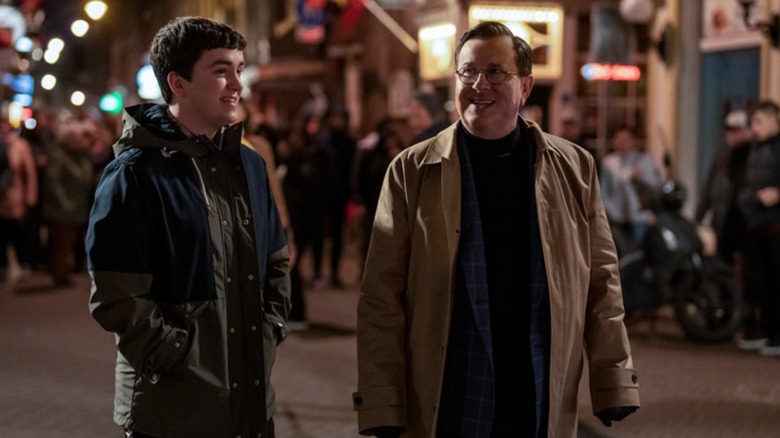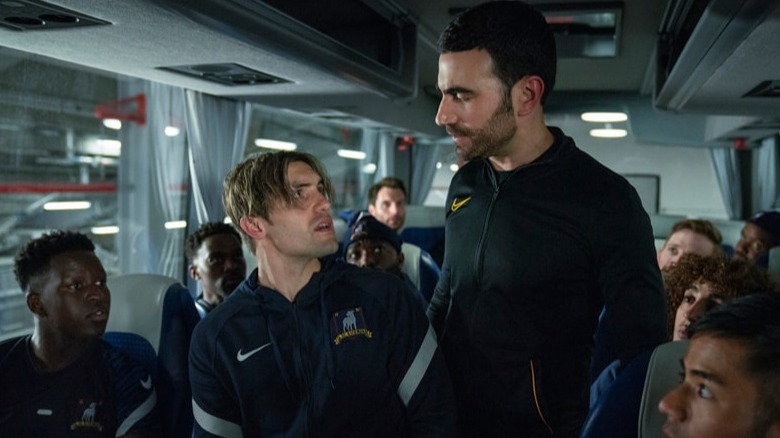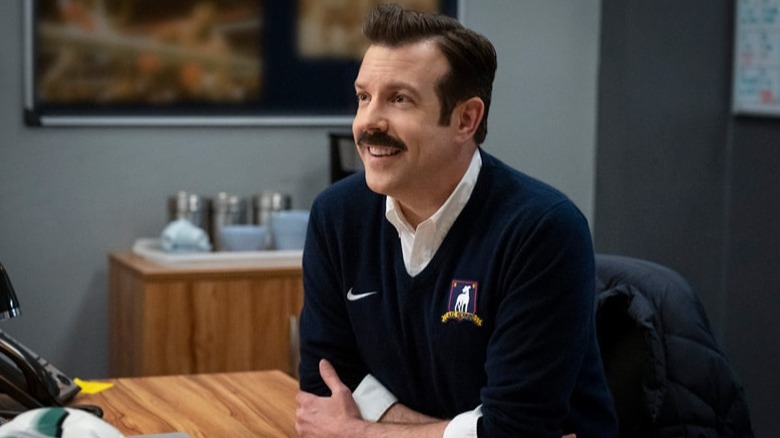Ted Lasso Forgot About Football This Week And Season 3 Has Never Been Better
This post contains spoilers for the latest episode of "Ted Lasso" season 3.
Does something feel different today? Is the air a little fresher, or maybe the sun's a bit brighter? I can't quite put my finger on it, but I think it might have something to do with the singular exhilaration of finishing an episode of "Ted Lasso" and actually feeling joy for the first time all season.
The third and possibly final season of "Ted Lasso" got off to a rocky start this year, and while fans of the series have been steadily getting on board with the show's new normal in recent weeks, I think we can safely consider episode six the point at which "Ted Lasso" fully got its groove back. The secret to righting the show's capsizing boat seems to have been as simple as a trip to Amsterdam, one that let every character forget about the source of their stress for just one night. That's right: "Ted Lasso" season 3 is at its best when it ignores its premise as a show about football entirely.
A night off is just what the team (and show) needed
"Ted Lasso" season 3 has provoked a wide range of responses from fans; I've spoken to people who gave up on the show entirely, and others who think it's pretty much as good as ever, but most seem to at least agree that something feels different. Episodes are longer and less comedic, key plots feel like they're treading water, and new characters take the focus off the ones we know and love. Despite being the longest "Ted Lasso" episode yet with a 63-minute runtime, "Sunflowers" actually side-steps most of these problems. It feels much lighter and swifter than the rest of the season, which sometimes comes across as a clunkily arranged series of unrelated plots. Most importantly, the endearing series actually makes us feel good for the first time in a long time.
"Sunflowers" is structured around a rare opportunity for AFC Richmond: a night off with no curfew in a touristy town. The team splinters into groups, and each one has its own adventure. Some are deep, like when Colin (Billy Harris) opens up to Trent (James Lance) about the ache of wanting to come out. Some are silly, as when the majority of the team gets trapped in a classic case of night-off decision paralysis, and wastes half their evening voting on what to do with their precious time.
Most are some lovely mix of the two, the type of emotional Trojan horse that made "Ted Lasso" popular in the first place. When Jamie (Phil Dunster) shows Roy (Brett Goldstein) the city, the pair end up talking about childhood traumas in a way that's perfectly fitting for two emotionally constipated dudes. When Ted (Jason Sudeikis), possibly tripping, wanders into an American restaurant, he's reminded of his dad, but he also ends up talking to some triangles.
Removed from the high-pressure season, these characters flourish
Rebecca's (Hannah Waddingham) detour was an especially lovely one. The character has been trapped with some of the least satisfying plots this season, getting weirdly hung up on a psychic's prediction and defaulting to anger at Ted and jealousy over her ex. With the exception of last week's fertility storyline, Rebecca's plots haven't been equal to Waddingham's talents, or even really in character. This week, though, she was given a low-stakes romance plot that turned out to be pretty dreamy; a conversation over dinner and wine, a foot rub so good it'll knock you out, and the feeling of being desired when everyone around you usually just sees you as the boss.
In short, this episode showed us that the AFC Richmond team just needed to relax, and perhaps we needed to relax with them. I've written before that "Ted Lasso" doesn't owe us comfort or a winsome attitude, even if it's what it's known for. I still think that's true, but at a certain point this season, the show's penchant for leaving us feeling uneasy became more tiring than entertaining. Characters like Ted, Rebecca, Nate (Nick Mohammed), and Roy have all been at emotional low points that seem directly tied to the pressure they're under in the Premier League. When this episode opened with a morose-looking Ted witnessing another loss, I braced myself for an hour that I was sure would leave me bummed out and annoyed.
This was anything but a filler episode
Luckily, the case of yips that seems to be plaguing the writers' room whenever they tackled the sports angle of the story seems to be easily curable; all these characters needed was a break from the show's very premise. Before this episode, the season's emotional beats have felt a bit forced, as if the show's writers are all too aware of how difficult it is to strike gold three times. But without the weight of possible relegation on their shoulders, the coaches and teammates are free to explore a city and themselves, and the result is an hour full of genuine-feeling moments that tell us more about these characters. While watching, I felt myself thinking about how much I'd missed this show, as if "Sunflowers" is the first time it was actually back.
Of course, there's no doubt that the Amsterdam detour will be met with some accusations of being a "filler episode," a common refrain that's almost always meaningless. It should be clear by now that "Ted Lasso" isn't about whether AFC Richmond wins a championship or gets booted down a league. The series is about the emotional journeys of characters we love and care about, and the difficult work of opening oneself up and being a little more earnest in a world that rewards emotional distance. Or, as Lance recalls Sudeikis telling him during the filming of season 1, "This whole show is about bad dads."
Ted Lasso finally feels like itself again
With that mission statement in mind, "Sunflowers" is anything but filler, as Roy and Jamie begin to process their relationships with their parents (or grandparents, in Roy's case) while Ted is able to be reminded of his own dad without feeling hurt by the memory. From day one, "Ted Lasso" has only used its sports plot as a means to better understand its characters. Ted's role as a coach allows him to play a Mr. Rogers-like therapist and father figure, able to ease these young men away from rage and anxiety and towards something lighter and more carefree. This episode feels like a culmination of what he's taught them. Everyone has been down on Ted's coaching abilities lately because AFC Richmond is losing, but it's clear this week that he's done a great job. His team's ability to have fun and be themselves without fear or shame is proof enough of that.
"Ted Lasso" isn't about winning or losing, but I'm delighted that this week's episode turned out to be a winner. It's unclear whether or not the team (and the series) have gotten their groove back for good, but for at least an hour this week, "Ted Lasso" finally felt like it was back in its prime — without a football or a goalpost in sight.




